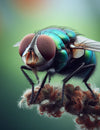
We have witnessed trends like “Go Green” or “Become more environment friendly” by individuals or organizations. There has been a seen significant change occupied by pest control companies toward using organic substances. Now, most pest control services also start providing services that use organic pesticides. You must have wondered what an organic or natural pesticide means.
So let us perceive what Organic means first. The word Organic is as confusing as simple as it looks. The term organic implies any substance derived from living things or can be explained as an element of carbon. And the same goes for organic pesticides.
“The pesticide made using no or minimum chemical adaption, products manufactured strictly by utilizing natural sources.”
Organic Gardening

When discussing organic pest control, one term certainly comes to mind: Organic Gardening. Organic gardening is known as a natural way of gardening, maintaining plants without using any synthetic chemicals. However, plants are more vulnerable to pest infestation when the growing criteria are not optimal.
One of the enormous reasons for having a pest problem in the garden is not using good quality or healthy soil. Using nutritional soil quality undoubtedly decreases the chances of having a pest problem. But that is not always it. Many horticulturists noticed pest problems even after the soil was at peak performance.
Infestation of pests is the symbol of encountering an unhealthy state of plants or gardens.
Synthesize or natural pesticide.
Chemicals can be described as either synthesized or natural chemicals.

Natural pesticide:
Natural pesticides exist in the environment and are induced either by plants or by the fermentation process. Therefore, when it comes to natural products, it is considered that they are entirely safe to use. But some natural chemicals exist, which can even be more harmful than synthetic pesticides.
One great example of that is “Nicotine.” It is a naturally produced substance induced by plant species. But can be deadly and hazardous even if consumed in a small amount. But the principle of using organic pesticides or substances is its perceived positive environmental impact. Organic substances can be fragmented into microorganisms.
Synthesize pesticides:
Synthesized pesticides are those made by humans, using some chemical reaction to terminate pest issues. Many pesticides are originated from specific species of pests. The deadliness of synthesized pesticides differs from the fact of what chemicals that particular pesticide encompasses. Some synthesized pesticides are prone to carcinogens, mutagens, and teratogens.
The biggest reason why synthesized pesticide are not advised to use as it doesn’t fragment into microorganism. And with even less toxicity, it is harmful to the environment.
Integrated Pest Management (IPM)
A gardener tends to use the least toxic pesticide at the start but uses more poisonous substances if the problem persists. Integrated pest management is an approach that manages weeds, insects, and diseases while considering the environment. IPM wields natural processes and biological and cultural practices to control the pest. IPM includes six steps to approach any problem.
Step 1: Correct identification of damage and responsible pests.
Step 2: Know blameworthy pests, plant life cycle, and biology.
Step 3: Observe and sample for pest population.
Step 4: Establish an acceptable damage threshold.
Step 5: Conclude on a significant management approach.
Step 6: Evaluate the result.
These six steps are vital terms to minimize the pest obstacle. Control methods of IPM disintegrate into four tactical categories: cultural control, mechanical and physical control, biological control, and chemical control. If the chemical approach necessitates controlling pests, they use pesticides at a minimal level. That too in crevices or cracks where problems are more intended to present. This strategy strives to be
- Cost-effective
- Most effective for killing pest
- Least environment destructive
- Organic Pest Control Effectiveness
Organic Pest Control Effectiveness
Both synthetic and organic methods are effective in controlling the pest. Synthetic pesticide acts faster. They comprise harsh chemicals which especially engineered to disrupt pest-specific biological functions. At the same time, the organic method works relatively slower and seeks patience.
Our nature has everything we need to resolve. So be more prone to use organic ways instead of chemicals.



